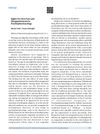 20 citations,
April 2012 in “Fertility and Sterility”
20 citations,
April 2012 in “Fertility and Sterility” Finasteride causes lasting fertility decrease in rats.
 13 citations,
August 2018 in “Facial Plastic Surgery Clinics of North America”
13 citations,
August 2018 in “Facial Plastic Surgery Clinics of North America” Adipose tissue shows promise for hair regrowth, but more research is needed to confirm best practices and effectiveness.
 7 citations,
August 2021 in “Heliyon”
7 citations,
August 2021 in “Heliyon” Phyllotex™ extract was found to significantly promote hair growth and protect against hair loss.
 3 citations,
July 2021 in “Drug Testing and Analysis”
3 citations,
July 2021 in “Drug Testing and Analysis” 5α-reductase inhibitors can interfere with doping tests by masking banned substances.
 66 citations,
June 2006 in “Journal of The American Academy of Dermatology”
66 citations,
June 2006 in “Journal of The American Academy of Dermatology” Finasteride increases hair weight and count in men with hair loss, with best results after four years.
 34 citations,
April 2014 in “Psychopharmacology”
34 citations,
April 2014 in “Psychopharmacology” Stress and alcohol affect brain chemicals differently in rats, mice, and humans, influenced by genetic differences.
 27 citations,
September 2017 in “Journal of Medicinal Food”
27 citations,
September 2017 in “Journal of Medicinal Food” Annurca apple supplement safely increases hair growth and keratin in humans.
 21 citations,
July 2018 in “The Journal of Sexual Medicine”
21 citations,
July 2018 in “The Journal of Sexual Medicine” The 2018 update to the ED care model added a new severity score and stressed a detailed evaluation of both physical and psychological aspects.
 20 citations,
October 2018 in “Clinical Drug Investigation”
20 citations,
October 2018 in “Clinical Drug Investigation” Dutasteride does not impair mental function in elderly men with enlarged prostate.
 19 citations,
March 2019 in “Behavioural Brain Research”
19 citations,
March 2019 in “Behavioural Brain Research” Finasteride use can cause depression-like behavior in male rats.
 14 citations,
March 2018 in “Translational Stroke Research”
14 citations,
March 2018 in “Translational Stroke Research” Finasteride helps protect brain in old male rats.
 14 citations,
October 2016 in “Psychoneuroendocrinology”
14 citations,
October 2016 in “Psychoneuroendocrinology” Finasteride affects brain processes related to neurotransmission and metabolism, potentially helping with neuropsychiatric conditions.
 2 citations,
January 2010 in “Hormone Molecular Biology and Clinical Investigation”
2 citations,
January 2010 in “Hormone Molecular Biology and Clinical Investigation” Low dose finasteride decreases certain steroids, possibly increasing depression risk.

Female rats showed more panic-related behavior than males, influenced by hormonal cycles and certain drugs.
 19 citations,
May 2020 in “Cells”
19 citations,
May 2020 in “Cells” Substance from human umbilical cord blood cells promotes hair growth.
 39 citations,
September 2013 in “Journal of Cosmetic Dermatology”
39 citations,
September 2013 in “Journal of Cosmetic Dermatology” Herbs can potentially treat hair loss by inhibiting a key enzyme and promoting hair growth, and deficiencies in zinc, biotin, and iron are linked to hair loss.
17 citations,
November 2021 in “Journal of Cosmetic Dermatology” Combination therapies for androgenetic alopecia work best but can have significant side effects and costs.
 January 2012 in “Human health handbooks”
January 2012 in “Human health handbooks” Low-level light therapy is FDA-approved for male pattern hair loss, increases hair count and strength, and is considered safe for use.
 21 citations,
August 2016 in “Translational Andrology and Urology”
21 citations,
August 2016 in “Translational Andrology and Urology” Delayed ejaculation is a complex issue caused by psychological, biological, and lifestyle factors, requiring a holistic treatment approach.
 3 citations,
June 2014 in “Klinik Psikofarmakoloji Bulteni-bulletin of Clinical Psychopharmacology”
3 citations,
June 2014 in “Klinik Psikofarmakoloji Bulteni-bulletin of Clinical Psychopharmacology” The document concludes that there is hope for future psychopharmacology research despite challenges in treating schizophrenia.
 71 citations,
January 2004 in “Dermatology”
71 citations,
January 2004 in “Dermatology” Oral finasteride works better than topical minoxidil for hair growth, both are safe.
 18 citations,
October 2017 in “Drug Design Development and Therapy”
18 citations,
October 2017 in “Drug Design Development and Therapy” DA-9401 helps protect rat testis from finasteride damage.
 May 2024 in “Brazilian Journal of Hair Health”
May 2024 in “Brazilian Journal of Hair Health” Finasteride-loaded nanoparticles were successfully created for potential improved hair growth treatment.
 212 citations,
September 2008 in “Journal of The American Academy of Dermatology”
212 citations,
September 2008 in “Journal of The American Academy of Dermatology” Minoxidil and finasteride treat hair loss in men, while minoxidil treats hair loss in women.
 104 citations,
October 1999 in “The Journal of Urology”
104 citations,
October 1999 in “The Journal of Urology” Finasteride doesn't harm male fertility or sperm quality, but may slightly reduce ejaculate volume.
 31 citations,
March 2015 in “The Journal of Steroid Biochemistry and Molecular Biology”
31 citations,
March 2015 in “The Journal of Steroid Biochemistry and Molecular Biology” Neuroactive steroids could become safe, effective treatments with more understanding of their complex brain actions and metabolism.
 26 citations,
April 2019 in “Journal of Cosmetic Dermatology”
26 citations,
April 2019 in “Journal of Cosmetic Dermatology” Herbal alternatives like saw palmetto and green tea may offer safe, effective treatment for hormonal hair loss.
 25 citations,
May 2020 in “Stem Cells Translational Medicine”
25 citations,
May 2020 in “Stem Cells Translational Medicine” ADSC-CE treatment safely increases hair density and thickness in androgenetic alopecia patients.
 15 citations,
June 2019 in “Journal of Neuroendocrinology”
15 citations,
June 2019 in “Journal of Neuroendocrinology” Isoallopregnanolone may be a safe and effective treatment for reducing tics in a mouse model of Tourette syndrome.
 8 citations,
January 2017 in “Fertility and Sterility”
8 citations,
January 2017 in “Fertility and Sterility” Urologic diseases and treatments in older men can negatively affect fertility, and doctors should talk to patients about this.





























